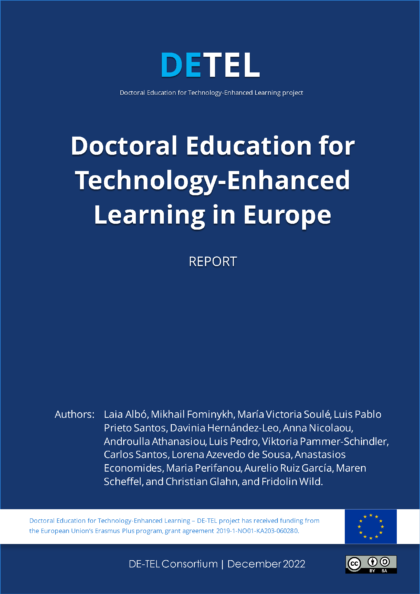Doctoral Education for Technology-Enhanced Learning in Europe
This report informs about the state of doctoral education in the area of Technology-Enhanced Learning (TEL) in Europe. The report aims to inform policy decisions in doctoral education and in the implementation of these policies.
We reviewed 35 cases of institutional doctoral education in TEL identified in 11 European countries. The results indicate that educational institutions use different approaches to doctoral education in technology-enhanced learning. The doctoral degrees in this field are awarded by departments in different academic areas, within different study programs, with correspondingly different curricula, and therefore heterogeneous foundational knowledge.
The report also contains the results of the survey of doctoral education in TEL. The objectives were to inform the design of curricula in the field, improve doctoral education overall, and to collect background on the current practices and challenges. The survey was implemented as an online questionnaire with 31 close and open questions in seven sections: professional background, thematic content, general PhD training topics, research methods, learning sources, challenges, supervision and mentoring, and personal background. In total, 229 participants responded to the survey, including 103 PhD candidates, 92 PhD holders, and 26 Master’s degree holders.
The survey results indicate that doctoral courses and educational materials are most needed in the TEL community for the topics: learning analytics, artificial intelligence in education, personalized and adaptive learning, self-regulated / informal learning, smart / intelligent learning environments, pedagogical patterns, gamification, visualization / visual analytics, mixed and augmented reality, and engagement / emotion / affect.
There is a need for courses and enough materials on the general PhD training topics of academic writing and publication, dissemination of research results, communication about research, project management, and research ethics.
The primary learning source for TEL topics is academic publications, for general PhD-level training is supervisor help, and for research methods: supervisor help, academic publications, and courses in the PhD program.
The most difficult barriers for TEL PhD candidates are work-life balance, project management, and psychological challenges. Among the different challenge areas, those related to supervision are the most reliable predictors of student satisfaction with their doctoral studies. Most innovative supervision practices, such as learning how to write scientific papers by example, team supervision, and discussion of the overall PhD ideas, were found useful by both PhD students and PhD holders. Many of the innovative supervision practices are rare within the TEL community.
Overall, doctoral education in TEL reflects the complexity of the interdisciplinary field of TEL. This report provides an input for curricula design, educational and supervision practices, examples of administrative contests, and existing challenges.
The report is published by the DETEL consortium with a CC-BY-SA-4.0 license. You are free to:
- Share – copy and redistribute the material in any medium or format
- Adapt – remix, transform, and build upon the material for any purpose, even commercially

Cite as
Laia Albó, Mikhail Fominykh, María Victoria Soulé, Luis P. Prieto, Davinia Hernández-Leo, Anna Nicolaou, Androulla Athanasiou, Luis Pedro, Viktoria Pammer-Schindler, Carlos Santos, Lorena Azevedo de Sousa, Anastasios Economides, Maria Perifanou, Aurelio Ruiz García, Maren Scheffel, Christian Glahn, and Fridolin Wild (2022) Doctoral Education for Technology-Enhanced Learning in Europe: report. DETEL Consortium. DOI: 10.13140/RG.2.2.32762.98243. URL: https://ea-tel.eu/de-tel/detel-report.
